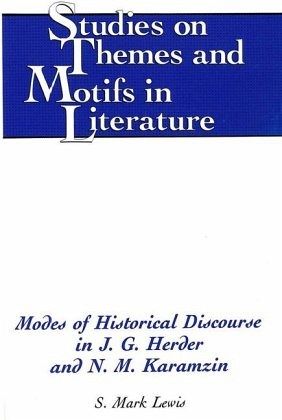Nicht lieferbar

Modes of Historical Discourse in J.G. Herder and N.M. Karamzin
Versandkostenfrei!
Nicht lieferbar
During the eighteenth century, the need for European literature to expand chronological and national boundaries and the function of historical discourse to articulate this need, found two valid supporters in the German philosopher J.G. Herder and the Russian author N. M. Karamzin. The present investigation illuminates the treatment of history by both Herder and Karamzin as a response to the enlightenment. These two seminal figures show numerous far-reaching similarities as transcenders of traditional aesthetic notions, innovators in the area of prose style and literary language, promoters of S...
During the eighteenth century, the need for European literature to expand chronological and national boundaries and the function of historical discourse to articulate this need, found two valid supporters in the German philosopher J.G. Herder and the Russian author N. M. Karamzin. The present investigation illuminates the treatment of history by both Herder and Karamzin as a response to the enlightenment. These two seminal figures show numerous far-reaching similarities as transcenders of traditional aesthetic notions, innovators in the area of prose style and literary language, promoters of Shakespeare and national folk literatures, and advocates of historicism. The question of Herder's direct influence on Karamzin is also examined and weighed against other influences. From a critical point of view, the common perspectives which emerge from this comparison provide new material for the study of historicism in some of its earliest forms. Indeed, the complex interplay between history and literature finds some of its most fundamental applications in these texts.



